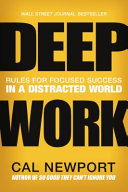

In today's economy, the ability to focus without distraction on cognitively demanding tasks is becoming increasingly rare and valuable. Cal Newport, the author, defines 'deep work' as professional activities performed in a state of distraction-free concentration that push your cognitive capabilities to their limit. This type of work is essential for mastering complicated information and producing better results in less time. Newport argues that those who cultivate this skill will thrive in an information-rich economy. He contrasts deep work with 'shallow work,' which consists of non-cognitively demanding tasks that are often performed while distracted. Shallow work is easy to replicate and doesn't contribute significantly to one's professional success. Newport emphasizes that deep work is not just a nice-to-have but a necessity for achieving high levels of productivity and creativity.
Continue readingNewport outlines four rules to help individuals incorporate deep work into their lives. The first rule is to 'Work Deeply,' which involves creating rituals and routines that foster deep work sessions. This includes setting specific times for deep work and minimizing distractions. The second rule is to 'Embrace Boredom,' which means training your brain to be comfortable with boredom rather than seeking constant distraction. The third rule, 'Quit Social Media,' encourages readers to evaluate the tools they use and eliminate those that do not provide substantial value. Finally, the fourth rule is to 'Drain the Shallows,' which involves minimizing the time spent on shallow work to free up more time for deep work. By following these rules, individuals can create an environment conducive to deep work and maximize their productivity.
Continue readingNewport emphasizes the importance of establishing rituals and routines to facilitate deep work. He suggests that having a consistent schedule can help individuals enter a state of deep focus more easily. This might involve setting specific hours for deep work, creating a dedicated workspace, or using tools like time-blocking to allocate time for different tasks. Newport also discusses the significance of having a clear definition of what deep work means for each individual, as this allows for tailored routines that suit personal preferences. By establishing these practices, individuals can reduce the cognitive load associated with decision-making and create a more conducive environment for deep work.
Continue readingNewport argues that downtime is crucial for maintaining high levels of productivity and creativity. He explains that taking breaks and allowing the mind to rest can lead to better problem-solving and more innovative ideas. This is because the brain continues to process information subconsciously during downtime. Newport encourages readers to embrace activities that promote relaxation and mental recovery, such as exercise, hobbies, or spending time in nature. By valuing downtime and integrating it into their routines, individuals can enhance their capacity for deep work and improve their overall well-being.
Continue readingIn the book, Newport discusses the detrimental effects of social media and constant distractions on our ability to engage in deep work. He argues that social media platforms are designed to capture attention and create a cycle of distraction, making it difficult for individuals to focus on meaningful tasks. Newport encourages readers to critically assess their use of social media and consider whether it adds value to their lives. He suggests that quitting or significantly reducing social media usage can free up mental space and time for deep work, ultimately leading to greater fulfillment and productivity.
Continue readingNewport advocates for developing a personal philosophy around deep work. This involves understanding the importance of deep work in your life and committing to making it a priority. He suggests that individuals should reflect on their values and goals and align their work habits accordingly. By cultivating a deep work philosophy, individuals can create a sense of purpose and direction in their professional lives, leading to more meaningful and productive work experiences.
Continue readingNewport concludes by highlighting the long-term benefits of engaging in deep work. He argues that cultivating the ability to focus deeply not only enhances productivity but also leads to greater job satisfaction and fulfillment. By producing high-quality work and developing expertise in their fields, individuals can position themselves for career advancement and personal growth. Newport emphasizes that the investment in deep work pays off over time, as it creates opportunities for innovation, creativity, and meaningful contributions to one's field.
Continue readingThe reading time for Deep Work depends on the reader's pace. However, this concise book summary covers the 7 key ideas from Deep Work, allowing you to quickly understand the main concepts, insights, and practical applications in around 23 min.
Deep Work is definitely worth reading. The book covers essential topics including The Importance of Deep Work, The Four Rules of Deep Work, The Role of Rituals and Routines, providing practical insights and actionable advice. Whether you read the full book or our concise summary, Deep Work delivers valuable knowledge that can help you improve your understanding and apply these concepts in your personal or professional life.
Deep Work was written by Cal Newport.
If you enjoyed Deep Work by Cal Newport and want to explore similar topics or deepen your understanding, we highly recommend these related book summaries:
These books cover related themes, complementary concepts, and will help you build upon the knowledge gained from Deep Work. Each of these summaries provides concise insights that can further enhance your understanding and practical application of the ideas presented in Deep Work.